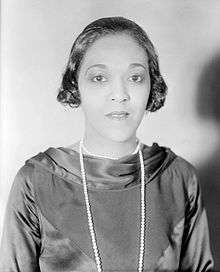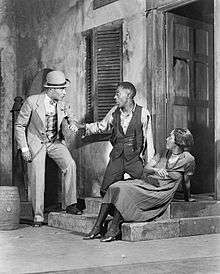Evelyn Ellis
| Evelyn Ellis | |
|---|---|
 Evelyn Ellis as Bess in Porgy (1927–30) | |
| Born |
February 2, 1894 Boston, Massachusetts, U.S. |
| Died |
June 5, 1958 (aged 64) Saranac Lake, New York, U.S. |
| Occupation | Actress |
| Years active | 1919–1953 |
Evelyn Ellis (February 2, 1894 – June 5, 1958) was an African American character actress of stage and film. Devoting herself to the theatre, her film roles were few, but she appeared in films including The Joe Louis Story and The Lady from Shanghai. Towards the end of her career, Miss Ellis, as she was called, also directed a few theater plays. The Baltimore Afro American newspaper in its issue in October 26, 1929, described her as a “quiet and unassuming young lady with a very charming personality".[1] An attractive woman who could have been a leading lady, she chose character roles.
Early life

Miss Ellis was born in Boston, Massachusetts, on February 2, 1894. Not much is known about her earlier life and introduction to acting, but she became a prominent actor within the black community starting in 1919 until 1955. Ellis made her theatrical debut at the Lafayette Theatre in Harlem in a production of Othello in 1919. She then moved to Broadway, making her debut in the production of Roseanne by Nan Bagby Stephen. Her next big Broadway show was Porgy in 1927, in which she is known for creating the character of Bess, and appeared with Rose McClendon and Frank H. Wilson. That same year, she played a lead role in Ernest Howard Culberston’s production of Goat Alley which dealt with black life in the slums of Washington, DC. She played the character of Lucy Bell Dorsey and was praised by the New York Times Theatre Review for “her telling portrayal".[2]She was inactive a few years due to the stock market crash of 1929 that led to the Great Depression, but she came right back and even started directing.
Ellis played in various other theatrical plays, such as Deep Are the Roots in 1945, in which she played Bella Charles. a housekeeper, and The Royal Family in 1952. Her next big role, however, was her lead role in Orson Welles’ Native Son, in which she played Hannah Thomas, the mother of Bigger Thomas, who was played by actor Canda Lee. She also played the same role a year later in an even more successful revival of the play. The Afro American Baltimore states her role was “so realistic that she had already earned the praised of Broadway critics”.[3] Ellis continued to play various lead roles through her year working with the Dunbar Players of Philadelphia. During this year, she also started a drama school in Long Island for youth.
Directing career
Ellis directed Horse Play in 1937 and then put on the play Little Woman in 1938 with the junior department at the Negro Little Theatre.[4] Her most notable work as a director as well as an actress is in the all-black production of Tobacco Road in 1950. She played the role of a starving mother which the New York Times singled out as “truthful elements that left a lasting impression”.[2] Through her directing of a youth play and her creation of the drama school, Ellis was active in getting younger kids interested in the art of drama.[3]
Other works
- Blue Holiday (1945),
- Supper for the Dead (1954).
- Easy Money (1921)
- A Son of Satan (1924) [5]
Death
Ellis made her last Broadway appearance in 1953[6] and ended her acting career in 1955 with her final film Interrupted Melody. Two years later, she died from a heart aliment on June 5, 1958, at the age of 64. She was hospitalized from December 1957 until her death at the Variety Club’s Will Rogers Memorial Hospital in Saranac Lake, NY.[7]
Selected filmography
- The Lady from Shanghai (1948) - Bessie
- The Joe Louis Story (1952) - the Fighter's Mother
- Interrupted Melody (1955) - Maid
See also
References
- ↑ "The Afro American Baltimore". Still Holding Her Own. October 26, 1929.
- 1 2 Hodges, Carolyn (1992). Notable Black American Women. Detroit: Gale Research Inc.
- 1 2 "The Afro American Baltimore". Evelyn Ellis Playing with "Native Son". 27 May 1947.
- ↑ "The Afro American Baltimore". "Little Women" at St. James Tonight. 22 October 1938.
- ↑ Smith, Jessie (2014). Black Women of the Harlem Renaissance Era. Maryland: Rowman & Littlefield. p. 74.
- ↑ Great Actors and Actresses on the American Stage in Historic Photographs p.69 c.1983 by Stanley Appelbaum
- ↑ Who Was Who On Screen 2nd Edit. page 141 c.1977 by Evelyn Mack Truitt
External links
| Wikimedia Commons has media related to Evelyn Ellis. |
- Evelyn Ellis at the Internet Broadway Database

- Evelyn Ellis at the Internet Movie Database
- Evelyn Ellis portraits (NY Public Library, Billy Rose Division)
- 1925 portrait